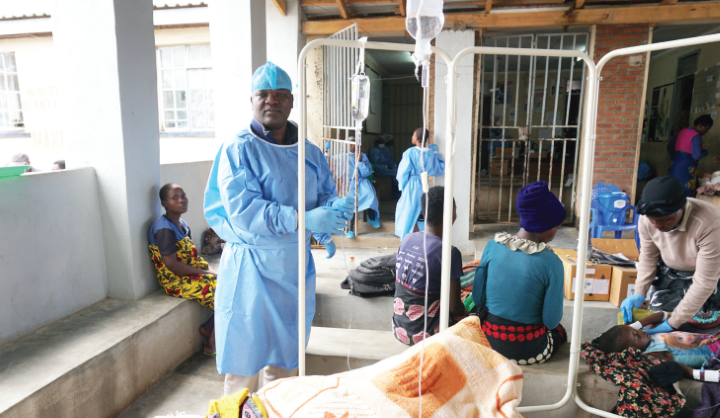High blood pressure, a silent killer
 Perhaps if Francis Gondwe had sought professional medical treatment he would have saved thousands of kwacha lost to traditional healers.
Perhaps if Francis Gondwe had sought professional medical treatment he would have saved thousands of kwacha lost to traditional healers.
The 32-year-old Gondwe, of Kalembo Village, Traditional Authority (T/A) Chemwamadi in Machinga, says he has struggled with a headache and dizziness for over 15 years.
“I was in Standard Five when I started feeling pain on my forehead. With time, the pain started spreading to other parts of my head. At first, my parents would buy me painkillers, but after sometime, they started taking me to herbalists. I have been using traditional medicine for over 10 years, but the problem never ended,” he says, adding that his parents believed it was something to do with witchcraft.
It was only in 2011 that Gondwe learnt that his real problem was high blood pressure.
“I got sick during the night and had no choice but to go to the hospital. I had developed a serious headache and was in deep pain,” he says.
He adds that it was after doctors carried out all health tests on him that he was diagnosed with the condition. He is currently on treatment and says he is no longer having the complications as before.
Gondwe is just one of the many people in the country who spend a lot of resources trying to fight health complications related to high blood pressure, not knowing that the problem is beyond that.
Scientists have defined high blood pressure as an abnormal rise in blood pressure above the normal blood pressure of 140/80mmHg. Normal blood pressure rises steadily from about 90/60mmHg at birth to about 140/80mmHg in a healthy adult.
Scientists are yet to know the real cause of the problem, but recent research has linked the problem to various health complications such as stroke, kidney failure and heart attack.
Professor Moffat Nyirenda of College of Medicine (COM), who is also associate director of Malawi-Liverpool-Welcome (MLW), says the main symptom for high blood pressure is headache.
“The dangerous part with high blood pressure is that you can stay healthy, but with the problem. Those who are prone to symptoms experience frequent severe headache and other minor common health complications,” he says.
How big is the problem in Malawi?
Nyirenda says the country is yet to have a national survey on high blood pressure involving every household, but says sample research has proved that the number of people living with high blood pressure is high.
In 2009, government and the World Health Organisation carried out a sample research on the extent of high blood pressure in the country. The research, titled Malawi National STEPS Survey for Chronic Non-communicable Diseases and Their Risks Factors, reveals that 33 percent of the 5 000 people drawn into the survey were living with high blood pressure.
The survey also says 94.9 percent of the people diagnosed with high blood pressure during the survey were not on medication and or were not aware that they are hypertensive.
PhD researcher at MLW Trust clinical research programme and ophthalmologist, Dr. Philip Burgess, says the best epidemiological evidence on high blood pressure indicates that approximately one in three adults (33 percent) in Malawi have high blood pressure and most do not know that they have the condition.
“High blood pressure is an important issue we should be talking now because it predisposes to serious illness, including heart attack, kidney failure, heart failure and stroke. If a patient has diabetes, they are at more risk of complications of diabetes if they also have high blood pressure,” he says.
Burgess advises people to go for diagnosis if they start feeling frequent headaches, dizziness, fatigue or a feeling of the heart racing (palpitations), saying they are part of complications linked to high blood pressure.
He says the condition can be controlled by modifying one’s lifestyle by reducing weight if overweight, reducing salt and alcohol intake, exercising, increasing intake of fresh fruits and vegetables and reducing intake of fatty and sugary foods.
Burgess advises people to go for high blood pressure screening at the hospital and take medication as prescribed by doctors.
On the other hand, Nyirenda says the challenge with high blood pressure is that it kills and it does not have a cure.
“The drugs we have can only help to control and keep blood pressure within the standard level. Once you have high blood pressure, it means you will live with the problem for the rest of your life and once you disobey the drug prescription, you are in for more health complications,” says Nyirenda.
He says the condition is becoming a serious challenge in Malawi because of information gap.
“It is time for both government and other authorities to sensitise communities and enhance the capacity to handle the problem. We should promote easy access to hospital screening and equip health centres with proper equipment for screening,” concludes Nyirenda.





